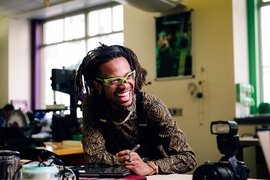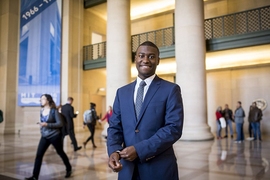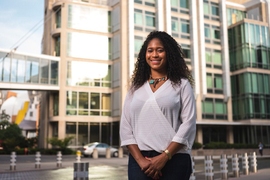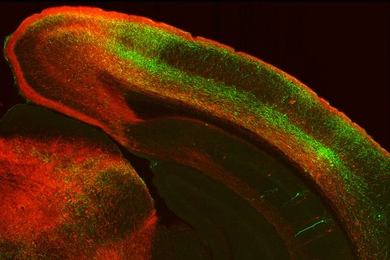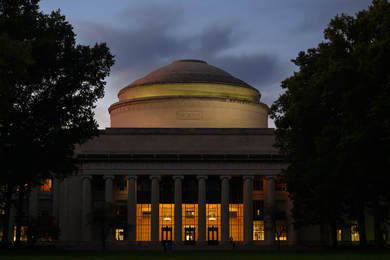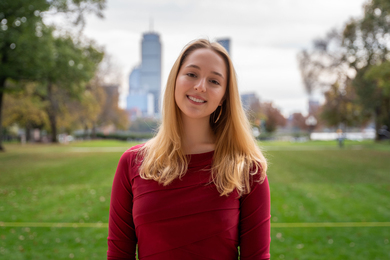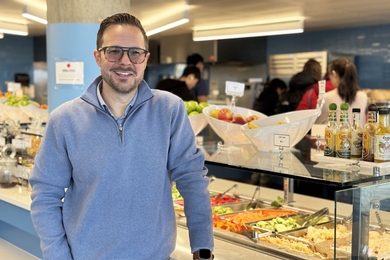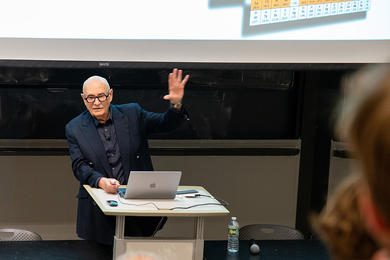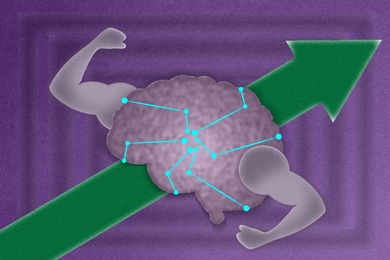Last year, during a reception on campus, MIT senior Joshua Charles Woodard was introduced to Claire Conceison, the Quanta Professor of Chinese Culture and professor of theater arts. The two proceeded to have a conversation in Mandarin, Woodard’s minor, which ended with an on-the-spot invitation for Woodard to visit Shanghai and study Beijing opera for two weeks with a small group of her students.
Woodard savored the experience and, as he now considers a career in diplomacy and East Asian affairs, still marvels at how one discussion had such a significant impact on his world view and his plans for the future.
The story may not be surprising to those who know Woodard, however, because striking up conversations to share different perspectives is one of his many pastimes. Whether making friends in foreign countries, discussing Institute policies as a member of the eight-student advisory cabinet convened by MIT President L. Rafael Reif, or serving as co-chair of the student community and living group Chocolate City, Woodard is always up for a discussion that leads to learning.
He dreams of a “willingness to connect the dots,” for people to acknowledge commonalities between different cultures despite nationalistic identities in an increasingly globalized world. “If I don’t reach across the aisle,” he says, “No one is going to.”
Exposing kids to STEM
Long before he set his eyes on policy and diplomacy, Woodard, who grew up on the South Side of Chicago, envisioned a future in engineering at MIT.
Childhood experiences with LEGO robotics and Northwestern University game design courses gave Woodard a foundation in STEM. By the time he was in the seventh grade, he knew he wanted to attend MIT for engineering.
However, he acknowledges most students from his community don’t have those childhood experiences that enable them to have similar goals. “I had a chance that others didn’t have,” he says, “Anybody can do what I’ve done, but it’s only a matter of exposure and getting to [students] early.”
While a junior at MIT, the mechanical engineering major worked on making those opportunities more available to underrepresented minorities, by co-founding the MIT BoSTEM Scholars Academy. The four-week summer program gives high school students valuable experiences in STEM and aims to put them on the path to MIT and other universities. Woodard worked with his co-founder Javier Weddington to raise $18,000 to fund the program, which debuted the summer of 2017 and will continue in the coming summers.
An expanding worldview
When Woodard was 16, he visited Paris on a school field trip. While he was purchasing items at a grocery store, a store employee complained to him about having to learn English to accommodate American tourists. The critique went further, and Woodard listened.
For Woodard, the experience was “a pretty direct challenge to my world views [as an American], and the starting point for me to form a framework for how to study the world.”
When he meets someone with a different cultural view, he opts to share his perspective with them and also listen to theirs. As an example, he describes his thought process when meeting someone who may not understand the meaning of the Black Lives Matter movement: “You have a set of experiences that didn’t expose you to this. If me taking half an hour to explain it to you can change your worldview so you can help someone else in the future, then it’s worth my time,” he says.
During orientation for the class of 2021, Woodard gave a speech to the incoming class about the impact personal experiences can have on the MIT community. He told a story about the frustration he felt when multiple Black Lives Matter posters on campus were vandalized, but how caring gestures from others reminded him of the value of openly discussing personal and controversial issues. At the end of his speech, Woodard urged students to “open your minds and hearts so you can learn from the world” and ultimately better their communities.
Chocolate City, a New House dorm community of current and former MIT students who share common backgrounds, interests, ethnicities, and experiences, further drives Woodard’s passion for conversation and leadership.
Chocolate City encourages its members to use their experiences to benefit the people from their cultural communities. As co-chair, Woodard spearheaded local outreach initiatives, led the efforts to work with the Institute’s administration to preserve the group’s on-campus housing, and encouraged members to engage in leadership positions throughout campus.
Along with the other students who made up the Presidential Advisory Cabinet, Woodard discussed with President Reif a wide range of issues affecting the MIT student body, from the current political climate, to campus infrastructure, to issues of particular importance to MIT communities of color such as recruitment and retention of faculty from underrepresented minority groups.
Diplomat in the making
Woodard’s affinity for connecting with others should serve him well in his area of interest after graduation, which is diplomacy and East Asian affairs, perhaps through work with the State Department.
Describing his belief that all human beings share a common set of values and desires, Woodard says, “That’s the type of mentality you’d have to have in foreign diplomacy.” After graduating from MIT, he hopes to continue to learn about the United States’s impact on developed and developing countries.
Woodard’s minor is Mandarin, which he says he chose over other languages due to China’s explosive economic growth and investment in America’s infrastructure.
During his Mandarin class, he “can learn about culture and learn about the world,” he says. He enjoys taking part in discussions on topics ranging from China’s one-child policy, to tiger moms, to Chinese internet censorship.
However, for Woodard, Mandarin is just the beginning.
“I want to know four languages by the time I’m 30: English, Chinese, Arabic, and Spanish. In that order,” he says.
Shutterbug
Woodard’s skills with both people and cameras also led him to launch his own photography business, JC Woodard Photography, during his first year at MIT. Since then, he has taken photos for sororities, fraternities, MIT events, as well as professional headshots for the MIT community. Most recently, he covered comedian Hasan Minhaj’s performance at MIT’s Fall Festival this past September.
“It’s exciting to capture people in moments of emotion,” he says. “Preserving the moment is so cool.”
He suspects his photography skill benefits from his personality. “I don’t know how not to smile, so I’m really personable,” he says, “If you give me a camera, I’m like ‘Hey! Give me a smile, let’s take a picture!’”
